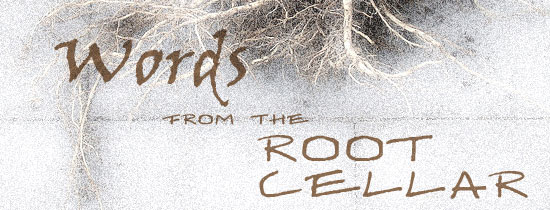 What Does Self-Sufficient Mean to You?
What Does Self-Sufficient Mean to You?
By Axie Barclay
Sustainable agriculture differs from traditional agriculture in many respects. One of the fundamentals is continual education, not just from seed and chemical reps, but actual book reading and discussion. Not to say mainstream farmers aren’t educated, but the focus is less on stewardship than on dollars of input per acre. It takes a lot more brainpower to reconcile environmental impact with actual dollars spent and overall human/animal happiness. Anyway, this need for continual education has slowly filled my book shelves with books pertaining to sustainability. I’ve realized the ideas inherent in sustainable agriculture carry over to life as well.
One aspect of sustainable agriculture is self-sufficiency, and this can vary greatly in degree. One of my favorite books, The Complete Idiot’s Guide to Self-Sufficient Living, works to define self-sufficiency for the modern world and does a bang-up job of it. Gone is the idyllic image of early morning milking the cow by hand, hand-tilling the garden, and churning your own butter, and in comes canning food bought from local farmers, raised bed gardens, and making your own yogurt (surprisingly easier than one would think). Carrying this idea a bit further, the important thing to remember is that neither sustainable or self-sufficient mean perfection. No farm is an island, especially if your kitchen garden is on top of concrete high-rise. This is self-sufficiency for the world of iPods. It means doing the best with what you have at the time, learning from your mistakes, and having a good time. For instance, if part of your vision for a sustainable lifestyle involves canning, and you hate canning, that’s not very sustainable, is it? Every year when canning comes around, so does the dread. If you don’t look forward to what you do on a daily or yearly basis, this will grind you down until it’s hard to get out of bed in the morning. (Thinking of my stepmom when I write this, but shhh! I don’t think she reads this column.) Whereas if you don’t particularly like the task, but take a different view of it, bring a friend over and watch chick flicks or mix a pitcher of peach margaritas while cutting and canning peaches, it makes an unpleasant task more palatable.
Because, I guess that’s what I’m getting at, sustainability is an attitude. Growing up in an area with lots of farmers, there’s a lot of talk about suffering. “I stayed out until three in the morning, running the combine nonstop until we got all the soybeans in,” is great, but if the farmer is miserable, what’s the point? Suffering for its own sake is rather medieval. Being sustainable is about being able to enjoy what you do, about the animals having a high quality of life, about living a lifestyle that makes you happy now, not about putting happiness off until the 401K kicks in. Being sustainable is about goal-setting and feeling pride and satisfaction in meeting those goals not for the sake of goal-setting, but for the result.
For instance, on our farm, I picture a happily fermenting compost pile, raised garden beds with low-tunnels in the wintertime, an herb garden with beehives nearby, cow-calf pairs harvesting grass as ruminant animals were meant to, chickens clucking away as they chase bugs and run making their meat healthy and strong. I see sharing it with someone who enjoys and shares the vision as much as I do, rather than the naysayers who stick with the Earl Butts, former Secretary of Agriculture, “get big or get out!” scenario. I picture my family taking care of the farm so it can take care of us and eliminate the need for two full-time jobs and three part-time ones to sustain everything. Because really the latter, the reality at present, is the one that’s unsustainable.
So the thing to take away from this ramble on sustainability is: everyone has to decide what is sustainable for them, whether it’s completely off the grid living, or setting time aside to put up food grown by others to supplement a family’s pantry over the winter. Self-sufficiency isn’t the same for everyone, every person has to define it for themselves. Whether it’s food, developing a new habit like writing every day, learning to cook or knit, or a million other things. Life is defined by extremes, but extremes are not sustainable. They deplete resources, environmental, physical, or emotional, and the toll of living in such a way is high. So find your balance: what, where and who makes you happiest, and you may find your level of self-sufficiency and sustainability.
As a classic farmer, my favorite reads are The Encyclopedia of Organic Gardening, The Rodale Herb Book, The Complete Idiot’s Guide to Self-Sufficient Living by Jerome D. Balanger, Mini Farming by Brett L. Markham, and various works by Joel Salatin and friends. For the more urban reader, or those who don’t have large acreages at their disposal, Portland Book Review has some great reads reviewed in the Home and Garden section.
Some good ones include:
City Farmer: Adventures in Urban Food Growing by Lorraine Johnson
Tips for Container Gardening by the Editors and Contributors of Fine Gardening
Growing a Farmer: How I Learned to Live Off the Land by Kurt Timmermeister
The Edible Front Yard: The Mow-less Plan for a Beautiful, Bountiful Garden by Ivette Soler
High-Impact, Low Carbon Gardening by Alice Bowe
And many more! (Anyone else hungry? Just saying… )
 Axie Barclay is a Michigan writer with a cow-habit. Having discovered the joys and potential for growth in alternative agriculture, she quests ever longer and harder for ways to combine farming and writing into a business. When not milking cows, making disgruntled noises at the latest disgusting thing the heeler dogs dredge up, riding horses, or keeping the fence up around her small beef herd, she’s holed up reading an eclectic array of books or tapping out pages. When not working, she enjoys kicking back with her honey, family, and friends at a bonfire with some beers. Chat her up on Twitter and Facebook, /axieb, or http://barclayfarmsandlit.blogspot.com where she delves into literature and agriculture with a relish… and occasionally ketchup. Soon to be homemade.
Axie Barclay is a Michigan writer with a cow-habit. Having discovered the joys and potential for growth in alternative agriculture, she quests ever longer and harder for ways to combine farming and writing into a business. When not milking cows, making disgruntled noises at the latest disgusting thing the heeler dogs dredge up, riding horses, or keeping the fence up around her small beef herd, she’s holed up reading an eclectic array of books or tapping out pages. When not working, she enjoys kicking back with her honey, family, and friends at a bonfire with some beers. Chat her up on Twitter and Facebook, /axieb, or http://barclayfarmsandlit.blogspot.com where she delves into literature and agriculture with a relish… and occasionally ketchup. Soon to be homemade.
